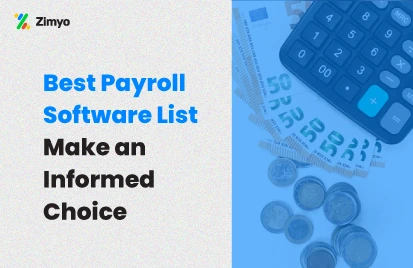In the dynamic landscape of professional life, negotiating salary is a pivotal skill that influences both financial prosperity and overall career fulfillment. Engaging in salary discussions with HR may initially seem daunting, especially when contemplating a job transition or seeking advancement. Whether you’re a seasoned professional navigating career shifts or a recent graduate stepping into the corporate world, adeptly handling salary negotiations with Human Resources (HR) is paramount.
This holds true not only for job seekers but also for HR professionals, as salary negotiations go beyond budget considerations. Indicating the significance of salary negotiation, an article reveals that over 26% of employees in India are at risk of changing jobs next year. Consequently, the negotiation process must extend beyond fulfilling the financial commitments of the company; it must also encompass the crucial task of ensuring employee satisfaction.
This blog post aims to equip you with proven strategies, empowering you to navigate salary discussions effectively and secure the compensation that rightfully reflects your worth.
Table of Contents
Overview of the Salary Negotiation Process
At its core, salary negotiation is a delicate yet empowering conversation that can shape your financial well-being and job satisfaction. Understanding the nuances of this process is essential for navigating it successfully. Here are the various stages involved in negotiating salary with HR:
Initiation
The negotiation process often begins when a job offer is offered or during performance appraisal discussions. Employees may also initiate discussions when taking on additional responsibilities or seeking advancement.
Information Gathering
Both parties gather relevant information. Employees research industry salary benchmarks, while HR considers the company’s budget and industry standards.
Proposal and Counterproposal
The employee presents their salary expectations based on research and self-assessment. HR may counteroffer or provide additional benefits to meet both the employee’s expectations and the company’s constraints.
Discussion and Agreement
Lastly, the negotiation concludes with an agreement that satisfies both the employee and the company. Effective communication is crucial at this stage to negotiate the salary with HR.
Understanding these stages helps individuals approach salary negotiations strategically, anticipating the flow of the conversation and preparing for potential counteroffers or objections.

Importance of Salary Negotiation
The significance of salary negotiation extends beyond individual financial gain. It serves as a critical tool for both employees and companies. Here’s why salary negotiation is important:
1. Employee Empowerment
Salary negotiation empowers employees to assert their value within the organization. It allows individuals to align their compensation with their skills, experience, and market standards.
2. Attraction and Retention of Talent
For companies, offering competitive salaries is a key factor in attracting and retaining top talent. A fair compensation plan contributes to employee satisfaction, loyalty, and overall organizational success.
3. Motivation and Job Satisfaction
Employees who feel fairly compensated are more likely to be motivated and satisfied in their roles. Job satisfaction positively influences productivity, engagement, and the overall work atmosphere.
4. Market Competitiveness
Companies that prioritize fair compensation and benefits are more competitive in the job market. A reputation for offering competitive salaries enhances the organization’s ability to attract skilled professionals.
Strategy for Negotiating Salary with HR
1. Research industry salaries
Before stepping into the negotiation room, thorough preparation is key. Start by researching
salaries as per industry standards to understand the fair compensation range for your role. Simultaneously, evaluate your skills, experiences, and achievements.
Begin by examining the current market rates for your position. Websites like Glassdoor, Payscale, and industry salary reports can provide valuable insights into salary benchmarks. Consider factors such as years of experience, education qualifications, and geographic location.
2. Evaluate your skills and experience
Conduct a comprehensive self-assessment. Reflect on your achievements, skills, and unique contributions to the organization. Understand the value you bring to the table, both quantitatively and qualitatively. This self-awareness will serve as a powerful tool during negotiations.
Additionally, setting realistic salary expectations is crucial. Consider your financial needs, while taking into account living expenses, future goals, and industry standards. Striking a balance between ambition and realism is key to entering negotiations with confidence.
3. Showcase your value proposition
A compelling value proposition is essential for effective negotiation. Identify and articulate your unique skills, showcasing how they align with the company’s goals. Highlight your past accomplishments and contributions to demonstrate how your skills and achievements contribute to the company’s success and growth.
Your value proposition should clearly communicate why you deserve the proposed salary. Therefore,you should use specific examples and quantify your impact wherever possible.
4. Handle counteroffers gracefully
Receiving a counteroffer or facing rejection is not the end of the negotiation process; it’s an opportunity to handle the conversation strategically. If faced with a counteroffer, carefully evaluate the terms and assess whether they align with your expectations and the market standards.
Handling rejection gracefully is essential for maintaining a positive relationship with the HR team. Express gratitude for the opportunity, seek feedback, and inquire about the possibility of revisiting the discussion in the future. Professionalism in the face of rejection can leave a lasting positive impression.
5. Assess the negotiation
After the negotiation concludes, it’s essential to reflect on the lessons learned. This involves considering what worked well, what could be improved, and how to build long-term relationships with HR for future growth. The ultimate goal is to reach a mutual agreement that satisfies both parties.
Evaluate the effectiveness of your preparation and communication strategies. Did your research on industry benchmarks contribute to a successful negotiation? Were your value propositions well-received by HR? Understanding what worked well can inform your approach in future negotiations.
Example of salary negotiation through email
For new job profile
Dear [HR Manager/Recruiter’s Name],
I hope this email finds you well. I want to express my gratitude for the job offer extended for the [Job Title] position at [Company Name]. I am excited about the opportunity to contribute to your team and bring my skills to [Company Name].
After careful consideration, I would like to discuss the proposed salary for the position. I am truly excited about the prospect of joining [Company Name], but I believe that a slight adjustment in the salary offer would better align with my skills, experience, and the current market rates for this role.
I have thoroughly researched industry benchmarks for similar positions in [Location/Industry], and based on my [X years] of experience in [specific skills], I would like to propose a salary of [Your Desired Salary]. I believe this adjustment reflects both my expertise and the competitive landscape in our industry.
Additionally, I want to emphasize my eagerness to contribute to [Company Name] and ensure my commitment to the success of the team. Beyond the monetary aspect, I am open to discussing other benefits, such as professional development opportunities, flexible work arrangements, or any additional benefits your team may offer.
Thank you once again for this exciting opportunity. I am looking forward to the possibility of contributing to [Company Name] and am hopeful that we can come to an agreement that reflects my skills and aligns with the values of your esteemed organization.
Best regards,
[Your Full Name]
For salary hike
Dear [Supervisor/Manager’s Name],
I hope you are doing well.
I appreciate the feedback received in the performance review meeting. Over the past [X years], I have had the privilege of contributing to [specific achievements or projects] and growing both professionally and personally.
As I reflect on my time here, I have taken on additional responsibilities and successfully contributed to the success of our team. I have thoroughly enjoyed being a part of the projects that [mention specific projects or achievements] and am proud of the value we have collectively added to [Company Name].
With this in mind, I would like to discuss the possibility of a salary adjustment. I have undertaken some research on industry standards for my role and have also considered my expanded role and accomplishments within [Department/Team]. Based on this, I propose a salary adjustment to [Your Desired Salary] per [month/year].
I believe this adjustment accurately reflects the market value for my role and responsibilities. It also takes into account my dedication to [Company Name]‘s goals and my commitment to delivering high-quality results.
I am open to further discussion on this matter and am willing to provide any additional information you may require to facilitate this process. I believe that this adjustment will not only be a recognition of my contributions but will also motivate me to continue giving my best to our team.
I appreciate your time and consideration on this matter and look forward to the opportunity to discuss it further. Please let me know a convenient time for us to meet and explore this topic in detail.
Thank you for your understanding and support.
Best regards,
[Your Full Name]
[Your Position]
[Your Contact Information]
Questions to ask during salary negotiation
Arming yourself with the right questions is pivotal for successful negotiations. Whether you’re negotiating for a salary increase, a job switch, or during a performance appraisal, asking the right questions demonstrates preparedness and strategic thinking.
For Salary Negotiation
- What is the salary range for this position within the company?
- How does the company approach annual salary reviews?
- Can you provide insights into the factors that influence salary decisions within the organization?
- Are there opportunities for performance-based bonuses or incentives?
- What is the typical timeframe for salary reviews or adjustments?
- Can you share details about the benefits package that accompanies the salary?
For Job Switch Negotiation
- What specific skills or contributions are highly valued in this new role?
- Are there any additional responsibilities or expectations associated with the increased compensation?
- Can you elaborate on the company’s career development programs or mentorship opportunities?
- How does the company support employees transitioning into new roles?
- Are there any unique perks or benefits tied to this particular position?
For Performance Appraisal
- How does the company measure individual and team performance?
- Are there opportunities for performance-based promotions within the organization?
- How does the company address salary disparities based on job performance?
- Are there training programs or resources available to help employees improve performance?
Wrapping up
In conclusion, mastering the art of salary negotiation is a valuable skill that can shape your financial future and professional satisfaction. By understanding the nuances of negotiation, researching diligently, and approaching the process with confidence and respect, you can navigate discussions with HR effectively.
As you continue to refine your negotiation skills, consider leveraging technology to enhance the overall process. In particular, explore the capabilities of Zimyo’s performance management software, a powerful tool that seamlessly syncs employee salaries with performance metrics. Top organizations leverage our solutions for salary benchmarking, performance evaluations, and streamlined communication.
FAQs (Frequently Asked Questions)
Freshers can emphasize their educational achievements, internships, and any relevant projects. Focus on the value you bring to the organization, even if it’s through potential and eagerness to learn.
While it’s generally recommended to wait until a job offer is extended, there are instances where discussing salary expectations during the interview might be appropriate. However, it’s crucial to gauge the timing and context to ensure a positive impression.
Absolutely. If salary negotiations reach an impasse, consider discussing alternative benefits such as additional vacation days, flexible work arrangements, professional development opportunities, or performance bonuses. These can enhance your overall compensation package.
It’s advisable to revisit salary discussions during key milestones such as performance appraisals, significant job role changes, or when taking on additional responsibilities. Regularly reassess your market value and contributions to the company to justify salary adjustments.
When conducted professionally and with respect, salary negotiations typically don’t have a negative impact on relationships. In fact, they can demonstrate your commitment and value. Maintain open communication, focus on facts, and express your enthusiasm for contributing to the company’s success.
HR technology, such as Zimyo’s performance management software, can streamline the salary negotiation process by syncing employee salaries with performance metrics. The platform also facilitates performance evaluations and seamless communication to facilitate informed and data-driven negotiation process.
HR professionals can ensure fair negotiations by staying informed about industry benchmarks, communicating transparently with employees, and leveraging technology for salary benchmarking and performance evaluations. Open communication, clear policies, and data-driven decision-making contribute to a fair and transparent negotiation process.




